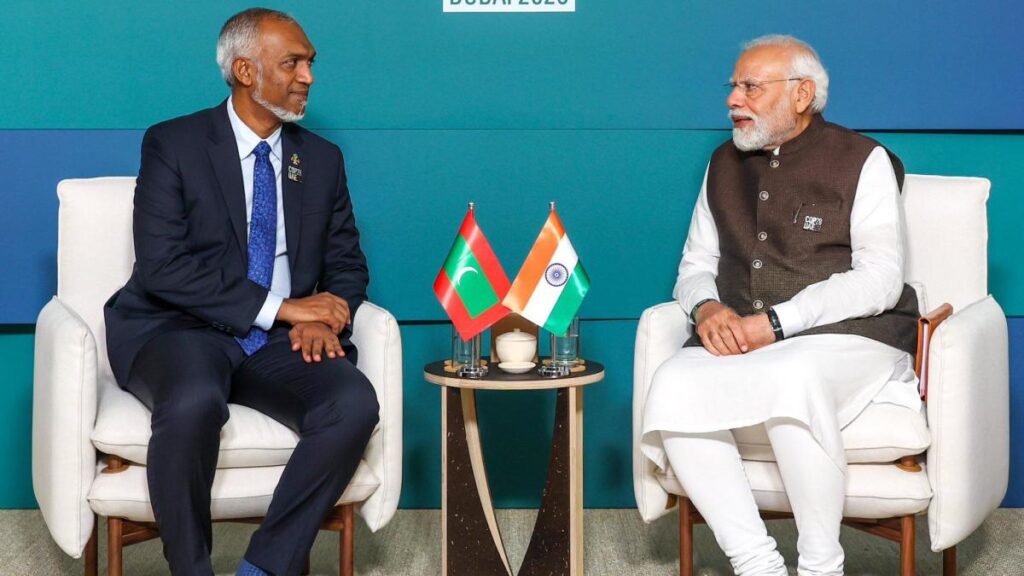Maldivian President Mohamed Muizzu is on a diplomatic mission to India this week, where he is expected to seek a financial bailout for the archipelago nation currently grappling with an impending economic crisis and fears of debt default. His visit marks his first official bilateral engagement after ascending to the presidency following a campaign that emphasized reducing India’s influence in the Maldives, famously known as the ‘India Out’ policy. This policy, while resonating with some domestic constituents, has strained ties between the two nations. Yet, experts are suggesting that the Maldives cannot afford to overlook its larger neighbor. As of September, the Maldives’ foreign exchange reserves were alarmingly low, approximately $440 million, sufficient for only a month and a half of imports. These economic straits have led to Moody’s downgrading the Maldives’ credit rating, indicating heightened default risks, further complicating Muizzu’s position as he approaches potential negotiations in India.
Before this visit to India, Muizzu opted for trips to Turkey and China, signaling a preference for engagement with non-Indian partners. His earlier visit to China in January was interpreted as a diplomatic snub towards India since prior leaders traditionally made Delhi their first destination. Additionally, a controversy unfolded when three Maldivian officials made derogatory remarks regarding Indian Prime Minister Narendra Modi, intensifying the already significant tensions between the two countries. Azim Zahir, a Maldives analyst, notes that Muizzu’s current visit represents both a shift in strategy and a recognition of the Maldives’ deep dependence on India, a dependency that cannot easily be replaced by other nations.
The Maldives is a small island nation composed of nearly 1,200 coral islands and atolls, with a population of about 520,000, dwarfed by India’s 1.4 billion citizens. The economic realities necessitate that the Maldives relies extensively on India for various essentials, such as food, infrastructure development, and healthcare. Although the agendas between the two governments have not been formally disclosed, financial discourse is expected to be a critical focus of Muizzu’s talks with Indian officials. Specifically, he aims to secure assistance in the form of grants and debt restructurings. Additionally, a crucial aspect of his mission is to negotiate a $400 million currency swap, aimed at bolstering the Maldives’ dwindling foreign exchange reserves.
Concerns are growing over the Maldives’ financial viability as foreign reserves fall significantly short of upcoming debt service obligations that require around $600 million in 2025 and over $1 billion in 2026, amid a substantial public debt of around $8 billion. Muizzu has previously stated that China might defer debt repayments for five years; however, tangible assistance from Beijing has yet to materialize. Consequently, Muizzu appears to be recalibrating his administration’s approach to India, realizing that the strained relations during his early tenure could lead to dire consequences for the nation, especially since negative sentiments and rhetoric have adversely affected Indian tourist arrivals.
Throughout his presidency, Muizzu has attempted to distance the Maldives from India, evidenced by demanding the withdrawal of Indian military personnel stationed in the country and choosing not to renew prior agreements, including a hydrographic survey cooperation. The administration’s antagonistic rhetoric reached a peak with disparaging remarks made by his officials about Modi, prompting significant backlash and calls for a boycott among Indian social media users. In response to the outrage, the Maldives government sought to distance itself from the comments, asserting they did not reflect official views. Simultaneously, Muizzu expressed frustration at perceived condescension from India, noting that the Maldives, despite its small size, should not be viewed as a nation that can be easily bullied.
Despite the earlier tensions, there are signs that relations between the Maldives and India may be improving. Muizzu attended Modi’s swearing-in ceremony for a third term in June, and following that, Indian Foreign Minister S. Jaishankar’s visit appeared to rekindle communication between the two countries. Jaishankar emphasized the significance of the Maldives to India’s “Neighbourhood First” policy, indicating that India still prioritizes its relationship with the Maldives. This recent diplomatic engagement is particularly relevant in light of regional dynamics, with India witnessing shifts in neighboring countries, as seen in the political changes in Bangladesh and Nepal.
Muizzu seems to have recognized that challenging India may not be a sustainable strategy for the Maldives, especially as economic indicators worsen. The loss of approximately 50,000 Indian tourists over the past year resulted in a considerable financial shortfall estimated at $150 million for the Maldivian economy. Without the necessary support from India, economists warn that the Maldives could face severe economic repercussions. Therefore, this upcoming visit is critical for Muizzu, as the decisions made during his discussions with Indian leaders may impact not just bilateral relations but also the future economic stability of the Maldives itself. The restoration of constructive dialogue with India may well be pivotal in averting a deeper crisis for this island nation.

